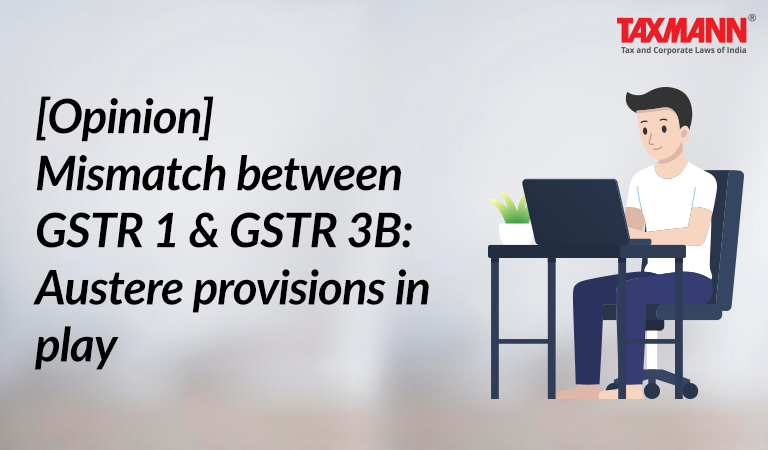[Opinion] Mismatch between GSTR 1 & GSTR 3B: Austere provisions in play
- Blog|News|GST & Customs|
- 3 Min Read
- By Taxmann
- |
- Last Updated on 21 December, 2022

Jigar Doshi & Sagar Shah – [2022] 145 taxmann.com 471 (Article)
It is not uncommon under the GST regime for registered taxpayers to disclose different turnovers in GSTR 1 and GSTR 3B. Some common reasons for such differences are amended supplies after filing of GSTR 1 but before filing of GSTR 3B, reporting of supplies in different tables in GSTR 1 and GSTR 3B, prior period transactions reported belatedly, any negative values on account of advance adjustment or credit notes etc. At the inception of GST and for a few years these reasons were reckoned by the department and no major repercussions followed. But in the recent past, the approach of the Government has changed. We are slowly but steadily moving towards the no tolerance policy wherein any difference in GSTR 1 and GSTR 3B is not tolerated by the officers. Moreover, the Government has also instituted various provisions in the law which grant extensive power to the officers to take notable actions again taxpayers when their GSTR 1 and GSTR 3B does not match even for a single month.
In this article, we wish to discuss some of these provisions and rules which a taxpayer must be aware of while preparing and filing their GSTR 1 and GSTR 3B and ensure that the turnover reflected in both reconciles.
Rule 21A of the CGST Rules which prescribes ‘suspension of registration’ states the following:
“21 (2) Where the proper officer has reasons to believe that the registration of a person is liable to be cancelled under section 29 or under rule 21, he may suspend the registration of such person with effect from a date to be determined by him, pending the completion of the proceedings for cancellation of registration under rule 22.
21(2A) Where, a comparison of the returns furnished by a registered person under section 39 with
(a) the details of outward supplies furnished in FORM GSTR-1; or
(b) the details of inward supplies derived based on the details of outward supplies furnished by his suppliers in their FORM GSTR-1,
or such other analysis, as may be carried out on the recommendations of the Council, show that there are significant differences or anomalies indicating contravention of the provisions of the Act or the rules made thereunder, leading to cancellation of registration of the said person, his registration shall be suspended and the said person shall be intimated in FORM GST REG-31, electronically, on the common portal, or by sending a communication to his e-mail address provided at the time of registration or as amended from time to time, highlighting the said differences and anomalies and asking him to explain, within a period of thirty days, as to why his registration shall not be cancelled.”
Further, Rule 21(f) of the CGST Rules, 2017, states that the registration granted to a person is liable to be cancelled, if the said person furnishes the details of outward supplies in FORM GSTR-1 under section 37 for one or more tax periods which is in excess of the outward supplies declared by him in his valid return under section 39 for the said tax periods.
Therefore, the above rules, when read in conjunction with each other, prescribe that a registered taxpayer’s registration can be cancelled if his turnover in GSTR 1 does not match with his turnover in GSTR 3B.
Another important section to refer here is Section 75(12) of the CGST Act, 2017 which was recently made effective and states that a proper officer can initiate recovery of taxes as prescribed u/s 79 of the CGST Act, 2017 if the GST payable as per GSTR 1 furnished by a taxpayer has not been paid fully or partially through GSTR 3B. This means where the turnover reflected in GSTR 1 exceeds the turnover reflected in GSTR 3B.
Therefore, basis the above, two important sections which can be triggered in case of turnover mismatch between GSTR 1 and GSTR 3B are Rule 21A and Section 79. Let us now understand what are the repercussions envisaged in such provisions.
Click Here To Read The Full Article
Disclaimer: The content/information published on the website is only for general information of the user and shall not be construed as legal advice. While the Taxmann has exercised reasonable efforts to ensure the veracity of information/content published, Taxmann shall be under no liability in any manner whatsoever for incorrect information, if any.

Taxmann Publications has a dedicated in-house Research & Editorial Team. This team consists of a team of Chartered Accountants, Company Secretaries, and Lawyers. This team works under the guidance and supervision of editor-in-chief Mr Rakesh Bhargava.
The Research and Editorial Team is responsible for developing reliable and accurate content for the readers. The team follows the six-sigma approach to achieve the benchmark of zero error in its publications and research platforms. The team ensures that the following publication guidelines are thoroughly followed while developing the content:
- The statutory material is obtained only from the authorized and reliable sources
- All the latest developments in the judicial and legislative fields are covered
- Prepare the analytical write-ups on current, controversial, and important issues to help the readers to understand the concept and its implications
- Every content published by Taxmann is complete, accurate and lucid
- All evidence-based statements are supported with proper reference to Section, Circular No., Notification No. or citations
- The golden rules of grammar, style and consistency are thoroughly followed
- Font and size that’s easy to read and remain consistent across all imprint and digital publications are applied



 CA | CS | CMA
CA | CS | CMA
